Argentina is gearing up to hold its upcoming October 22 general election, in which five candidates will compete to lead the economically ailing nation for the next four years.
In addition to the president and vice president, the Argentine electorate will also head to the polls to fill 130 of the National Congress’s 257 seats as well as 24 of the 72 available Senate seats and some regional positions. The Argentine electorate will also get to vote to choose 43 new Argentine representatives at the Parlasur, the parliamentary institution of the Mercosur regional trade bloc.
According to Argentina’s electoral law, the five presidential candidates must obtain either more than 45 percent of the votes cast or have more than 40 percent and a difference of more than ten percent ahead of the second-place candidate to become elected president on October 22. If not, a runoff election will take place between the two most-voted candidates on November 19.
Whoever becomes President-elect will take office on December 10, the date when Alberto Fernández’s four-year term ends.
All five presidential candidates that will appear on the October 22 ballot, along with the legislative and regional candidates, were chosen in an open primary election process in August. Every candidate was required to obtain at least 1.5 percent of the votes during the primary to be on October’s ballot.
Although there are five presidential candidates, polls have consistently shown that the election will be a three-person race between Javier Milei of the La Libertad Avanza (“Liberty Advances”) coalition, Patricia Bullrich from the Juntos por el Cambio (“Together for Change”) center-right coalition, and current Argentine Economy Minister Sergio Massa of the Union por la Patria (“United for the Homeland”) leftist coalition.
The latest round of poll results published by the Argentine Newspaper La Nacion — all of which were taken between October 9-11 — show Milei winning with an average slightly above 30 percent, followed by Massa nearing 30 percent, and Bullrich trailing behind with 21-28 percent depending on the polling agency.
Javier Milei
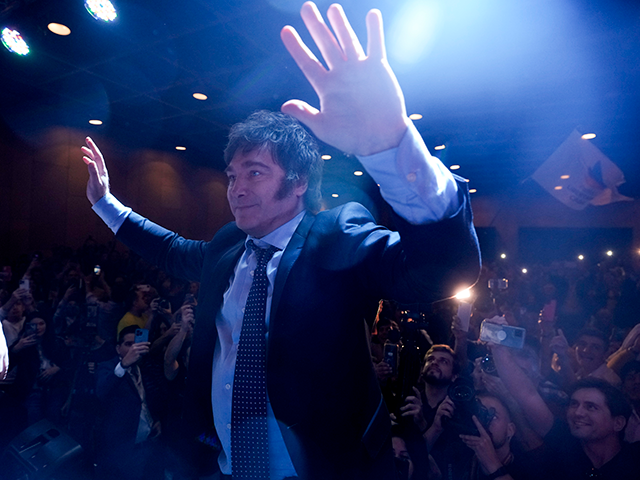
Argentina presidential candidate Javier Milei arrives to present his book “The End of Inflation” at the Buenos Aires book fair in Buenos Aires, Argentina, Sunday, May 14, 2023. (AP Photo/Natacha Pisarenko)
A 52-year-old libertarian economist and the presidential race frontrunner. Milei, who is also presently a lawmaker, was the most-voted candidate during August’s open primary process with over 30 percent of the votes. Milei has proposed to carry out significant reforms to Argentina’s government and economic system, starting with the elimination of the Argentine Central Bank and replacing the Argentine peso with the U.S. dollar, a process commonly referred to as a “dollarization.” Other regional countries such as Ecuador, Panama, and El Salvador have successfully implemented dollarization in past years to control inflation.
Milei also proposes to eliminate ten of the Argentine federal government’s 18 federal cabinet agencies (ministries).
The front-running candidate has vehemently maintained an anti-communist stance throughout his career, an ideology he has denounced as a “murderous system.” While embracing classical liberalism, Milei has rejected “free market” operations with communist countries, including China. Milei has promised he would cut federal government ties to Beijing as he “doesn’t do business with communists.”
The anti-establishment candidate has repeatedly lashed out against his country’s establishment politicians, who he refers to as “the caste.” Milei has fiercely proclaimed to be pro-life, and as such, he has promised to implement policies to protect unborn children.
EL PRÓXIMO PRESIDENTE DE ARGENTINA pic.twitter.com/NYPglCLD8K
— Eugenia Rolón (@EugeniaRolon_) October 12, 2023
Muchas gracias SALTA…!!!
LA LIBERTAD AVANZA
VIVA LA LIBERTAD CARAJOhttps://t.co/33ivMdPlSH— Javier Milei (@JMilei) October 13, 2023
En Salta se respiran aires de LIBERTAD.#UnaArgentinaDistinta pic.twitter.com/5aAK4lJVYo
— Martin Menem (@MenemMartin) October 13, 2023
Prior to his current tenure as a lawmaker, Milei developed a public presence through online economics lectures, viral television appearances, and participating in interviews. Milei played soccer as a goalkeeper for a local team in the Buenos Aires neighborhood of Chacarita before enrolling in Argentina’s Belgrano University to become an economist.
In his youth, Milei starred in his own rock band called “Everest,” which focused on performing covers of Rolling Stones songs in addition to its own original “provocative” tracks that often featured lyrics of a sexual or uninhibited nature that he described as “rock porn.” The Libertarian economist also claims to be an “expert” tantric sex teacher.
It’s worth mentioning that Milei’s 30 percent electoral performance during the open primary process was vastly higher than the average of 15 percent that most polling agencies at the time had predicted.
Patricia Bullrich
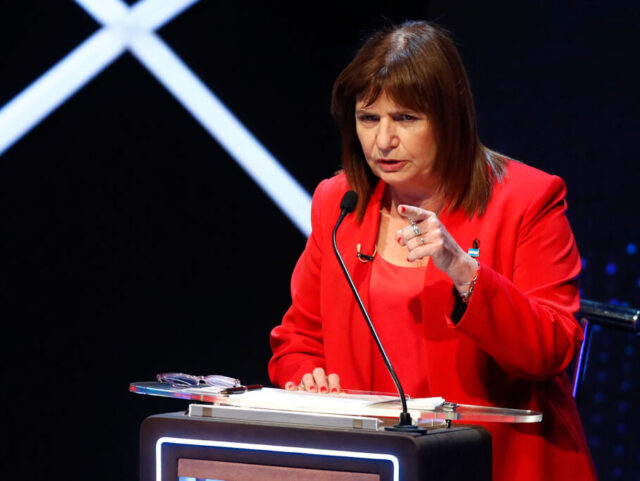
Presidential candidate for Juntos Por El Cambio Patricia Bullrich speaks during the final debate ahead of the presidential elections at Facultad de Derecho of Universidad de Buenos Aires on October 08, 2023 in Buenos Aires, Argentina. (Agustin Marcarian – Pool/Getty Images)
Bullrich served as security minister under the government of center-right President Mauricio Macri (2015-2019) and as a lawmaker between 1993-1997 and 2007-2015. The 67-year-old candidate has promised to implement a “dual currency” system in Argentina, where the nation’s peso and the U.S. dollar can freely circulate in the country, as opposed to the current convoluted currency control system under outgoing President Fernández. Bullrich has also promised to carry out reforms that grant autonomy to the Argentine Central Bank and state reforms to reduce spending.
¡Gracias Chubut! 💪❤️🇷 pic.twitter.com/FXldod2VAe
— Patricia Bullrich (@PatoBullrich) October 13, 2023
The former security minister has also promised to carry out work and social reforms to reduce unemployment. Bullrich, who has expressed her support of United States President Joe Biden’s gun control stance, is against civilians being able to arm themselves. Instead, she has stated that it is “convenient” that security forces be the ones to take care of people. She has proposed to create a “special criminal intelligence police” to crack down on Argentina’s most dangerous gangs and build special prisons for drug traffickers.
Sergio Massa
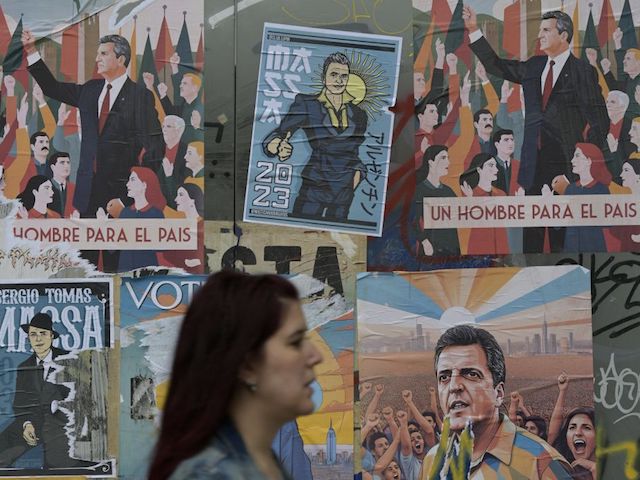
A woman walks past electoral propaganda of Economy Minister and presidential candidate of the Union por la Patria party, Sergio Massa, made with AI (artificial intelligence) in Buenos Aires on October 3, 2023, ahead of Argentina’s presidential election to be held on October 22. (JUAN MABROMATA/AFP)
Argentina’s current economy minister under Fernández.
Massa, 51, has overseen Argentina’s debt review negotiations with the IMF and the nation’s currency swap deals with China.
Argentina no puede tener un presidente que niegue el cambio climático. pic.twitter.com/nV8bggFuIG
— Sergio Massa (@SergioMassa) October 10, 2023
The election marks Massa’s second attempt to win the presidency after having an unsuccessful run in 2015 under the Unidos por una Nueva Alternativa (“United for a New Alternative”) coalition, only obtaining 21.39 percent of the votes in that race.
The economy minister is running to maintain the current ruling leftist coalition after both President Alberto Fernández and current Vice President and former two-time President Cristina Fernández de Kirchner (no relation) chose not to run in the October 2023 election.
Massa, a lawyer and former lawmaker, promises to lead a “unity” government with representation from several different parties that steers away from the far-left aspects of the current Peronist government represented by Fernandez de Kirchner.
Massa has stated that he will solve Argentina’s complicated economic situation — which continues to worsen under his tenure — through fiscal balance, trade surplus, the implementation of a competitive exchange rate that does away with the current closed and convoluted system, and through “inclusive development.”
Juan Schiaretti
Schiaretti, a 74-year-old public accountant and current governor of the Córdoba province, is the candidate for the Hacemos por Nuestro País (“We Do for Our Country”) leftist coalition, representing a splinter Peronist group that broke away from the ruling Kirchnerists.
Schiaretti is a proponent of the concept of “Social Justice,” which he describes as the “basis of all public action and makes up the essence of the government program.” His presidential proposals include a “macroeconomic stabilization plan” that is based on having no fiscal deficit – which, according to him, can be achieved without the need for a “wild adjustment.”
En un encuentro con trabajadores de la #EconomíaPopular, me comprometí a promover a nivel nacional que una parte de las compras del Estado se hagan a este sector. Como hacemos por ley en #Córdoba, y que nos permitió este año comprar 70 mil mochilas y cartucheras para… pic.twitter.com/cwur6eYSDH
— Juan Schiaretti (@JSchiaretti) October 13, 2023
The governor is also proposing “prudence and discipline in monetary issuance, fiscal balance and recomposition of reserves.” Additionally, he proposes education reforms that wold include a new “fourth level” of work and job training education for both teenagers and adults, as well as public health and women rights reforms. Schiaretti obtained 3.8 of the votes during August’s open primary election.
Myriam Bregman
Bregman, a self-declared “proud Trotskyist,” is the candidate for the Frente de Izquierda y de Trabajadores – Unidad (“Left and Workers’ Front – Unity”) coalition.
La Rusa, historia de una troska – Revista Anfibia https://t.co/H7PSbc13hV vía @sharethis
— Myriam Bregman (@myriambregman) November 19, 2016
The 51-year-old lawyer and lawmaker, who only obtained 2.7 percent of the votes in August’s primary process, has promised to implement far-left policies in Argentina if elected president.
Bregman seeks to carry out a complete nationalization of Argentina’s foreign trade, mining, agrarian and industrial sectors, placing them all at the “full management of workers.” The far-left candidate has also promised to implement a “single, state, free, and secular” national education system that would eliminate all subsidies to private and Catholic schools while forcing the implementation of a “scientific sex education with a gender perspective” curriculum.
Bregman’s presidential campaign also calls for the nation’s health system to be fully financed by the state and “controlled” by health workers and professionals, as well as a prohibition on being able to fire or suspend workers from their jobs.
___
The election will take place at a time when Argentina continues to face extremely dire economic and social distress under the government of outgoing leftist President Alberto Fernández, who chose not to present himself for reelection.
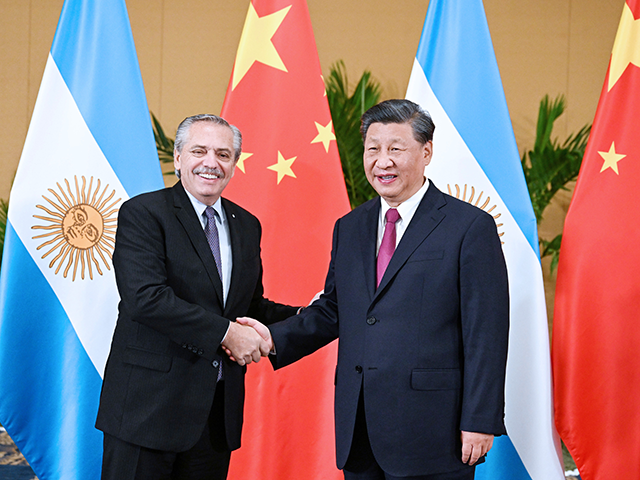
Chinese President Xi Jinping meets with Argentine President Alberto Fernandez in Bali, Indonesia, Nov. 15, 2022. (Photo by Rao Aimin/Xinhua via Getty Images)
The complete meltdown of the South American nation’s economy under Fernández has left Argentines with a near-worthless peso that lost over 1000 percent of its value in the past four years. Argentina has also faced years of continued rampant inflation. September’s inflation rate reached 12.7 percent, doubling the six percent experienced by Venezuela, the region’s defacto inflation powerhouse, that month.
Fernández’s pro-China policies also allowed the Communist Party to spread its influence and exert control of some of Argentina’s key strategic sectors such as energy.
Under Fernández, Argentina – a nation that has predominantly been ruled by leftist governments – reportedly received $111.8 billion in Chinese “rescue” funds between 2000 and 2021. Fernández joined China’s predatory Belt and Road Initiative (BRI) debt trap program in February 2022. Fernández also pushed Argentina away from the U.S. dollar and sought to embrace the Chinese yuan for its imports.
Argentina holds a huge debt of approximately $40 billion to the International Monetary Fund (IMF), which it began to pay with yuan obtained through a currency swap deal signed with China. Fernández’s government left the country with near-zero foreign cash reserves that a convoluted multi-tier currency control exchange system failed to mitigate.
Christian K. Caruzo is a Venezuelan writer and documents life under socialism. You can follow him on Twitter here.
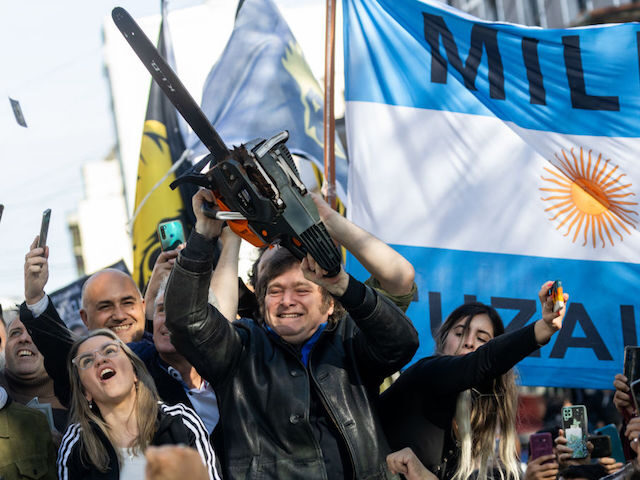
COMMENTS
Please let us know if you're having issues with commenting.